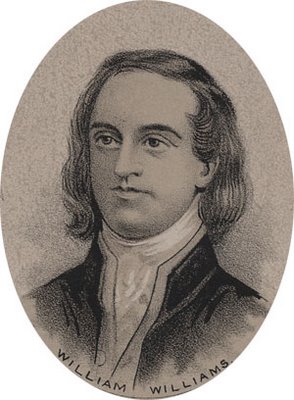William Williams was a delegate to the Continental Congress for Connecticut, and a signer of the Declaration of Independence.

William Williams, signer of the Declaration of Independence
Public domain image.
William Williams was born on Apris 23, 1731, in Lebanon, Connecticut. William’s father was a minister in Lebanon and wanted William to also go into ministry. He actually planned on becoming a minister (and eventually studied theology for a year); but he decided he wanted to attend law school first. He enrolled at 16, and in 1751 (at 20), William graduated Harvard.
He was described as a man of medium build and well-proportioned, with dark brown eyes and black hair. He was pretty self-controlled, but when he was passionate about something, his language was described as “violent.” His plans for becoming a minister, however, were disrupted when the French and Indian War came about and William signed up to fight near Lake George with his uncle, who died during the fighting. This experience made William a little bitter towards the British officers, whom he found to be haughty and condescending.
When the war ended, William returned to Lebanon and opened a store and became a pastor. On February 14, 1771, William married Mary Trumbull, whose brother John Trumbull became a famous painter of the American Revolution. Mary’s father was the only Royal Governor who supported the Patriots’ side of the conflict. Together, William and Mary had three children.
Williams’ life took a political turn when he served as the Lebanon town clerk, a position he held for 44 years. From there, he served on the State House of Representatives, even serving as the House speaker. In 1776, William Williams was asked to go as a delegate to the Continental Congress to replace Oliver Wolcott, who grew too ill to carry on his role in Congress. Upon arriving at congress, he was too late to vote for independence, but he did get a change to sign the Declaration of Independence. He continued to serve on different committees until the end of the war. He served on the committee which ratified the Articles of Confederation.
When the war began, William returned to his home and continued his life at his store and his church. He served as a judge of the probate court, and was assistant councilor and councilor. He served attended the Hartford Convention that ratified the United States Constitution. Nothing else is really known about how he finished his last years, except that he served as a County Court judge. His oldest son, Solomon died in 1810, and William Williams didn’t ever fully recover from the painful shock. His health declined over the next year, and he died on August 2, 1811.


